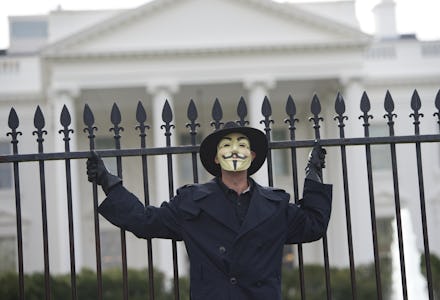The Groups Anonymous Inspired Are More Powerful Than Anonymous Ever Was

Anonymous' latest exploits haven't been impressive.
It went after the Klu Klux Klan, but produced only a dubious list of alleged Klansmen. It went after Donald Trump, exposing some basic personal information and doing absolutely nothing to his campaign.
The age of Anonymous, the years it was known for exposing institutional corruption and taking down major government websites, might well be over.
Read more: "Hacktivists" Aren't Social Justice Warriors. They're Assholes.
But Anonymous' influence reaches far beyond its own operations. The secretive hacktivist group inspired a generation of antisocial, home-grown rebels ready to wreak havoc in the name of whatever cause is conveniently in reach.
Here's a shortlist of some of Anonymous' notable spin-offs and derivatives.
Hollywood Leaks
Hollywood Leaks was an Anonymous spin-off that primarily went after, well, Hollywood. It leaked early PDFs of Allure magazine photoshoots. They hacked and tweeted "Gucci Gucci" rapper Kreayshawn's nude selfies along with celebrity contact information. They thoroughly doxxed health insurance information and an entire album from singer and Dancing With the Stars winner Julianne Hough.
The group claimed its targets were "as numerous as the sands of time," a way higher number than the amount of celebrities in Hollywood.
Why did they target celebrities?
"We're doin' it 'cause we can, 'cause it's fun, 'cause why not?" one member of Hollywood Leaks told the Daily Dot in 2011. "Fuck Hollywood — fuck that vapid greedy bullshit. Fuck the 'artists' who aren't more than 'products.'"
It's unclear how releasing the private nude photos of D-list celebrities contributes to the dismantling of consumer capitalism. Since leaking Hough's information, Hollywood Leaks hasn't surfaced in the news.
Ghost Security Group
Every month, some splinter faction of Anonymous claims it's declaring war on some politician or police force, making empty promises to wipe them from the internet. Ghost Security Group is one of them — and it means business.
After the Charlie Hebdo attack in January, 2015, an Anonymous splinter group called GhostSec launched #OpISIS, working 24 hours a day to find jihadi social media accounts in the tens of thousands and report them. Eventually, when it started infiltrating ISIS communities, it realized it had information about actual terrorist organizing that could be useful to the government.
So it decided to work with the feds.
GhostSec became Ghost Security Group, and is still infiltrating ISIS accounts and communities, keeping the government abreast of what it learns.
The rest of Anonymous, of course, isn't too pleased.
The Script Kiddies
A couple of days before the 10th anniversary of 9/11, NBC News sent out a frightening tweet. "Breaking News! Ground Zero has just been attacked," it said. "Flight 5736 has crashed into the site, suspected hijacking. more as the story develops."
The tweet created a momentary panic before the Script Kiddies took credit, right there on NBC News' corporate Twitter feed.
The Script Kiddies pulled a similar stunt with @foxnewspolitics, tweeting about a fictional Obama assassination. The Federal Bureau of Investigation opened an investigation, and coincidentally the group wasn't heard from again.
Backtrace
As Anonymous emerged as more than just a group of flagrant and semi-threatening trolls on the internet and became more of a political operation, there were some who didn't like Anonymous' newfound sense of purpose and reason. People who missed the mischief and chaos call the more socially conscious anons "moralfags."
In 2011, a sect of Anonymous that called itself Backtrace broke off and vowed to expose and destroy certain members of the hacktivist collective.
In addition to targeting Anonymous, Backtrace repeatedly went after members of the hacking group LulzSec, doxxing popular anon Hector "Sabu" Monsegur months before he was even arrested for hacking. Which brings us to...
LulzSec
LulzSec is Anonymous' most notorious supergroup — a collective of hacktivist rockstars who broke off to form a small cadre of hackers bent on a number of political schemes.
It hacked PBS for what it thought was unfair treatment of WikiLeaks in an episode of Frontline. It brought down the Central Intelligence Agency's website. It hacked porn sites, gaming companies, the media and corporations in order to expose security flaws and have a blast in the process.
And then it imploded. LulzSec leader Sabu turned out to be an FBI informant, and various other members like Ryan Cleary and Jake Davis were arrested.
Just as outrage and ideological differences led Anonymous to splinter time and time again, LulzSec had its own spinoffs and imitators.
Once LulzSec members were rounded up and prosecuted, there were even more groups — MalSec, SpexSec, LulzSec Reborn — as if another head had simply been cut from the hydra.
But most of the popular hacks of today aren't coming from Anonymous, or even its splinter cells. They're coming from experienced, small groups of capable hackers with no need for masks or ideals. The people who hacked Ashley Madison and Planned Parenthood aren't going out of their way to convince us they're out to do justice. At least we don't have to pretend they're on our side.